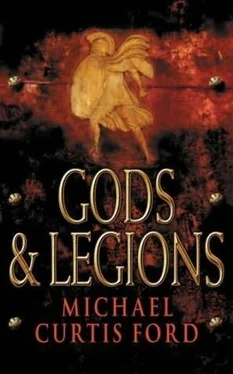Michael Ford - Gods and Legions
Здесь есть возможность читать онлайн «Michael Ford - Gods and Legions» весь текст электронной книги совершенно бесплатно (целиком полную версию без сокращений). В некоторых случаях можно слушать аудио, скачать через торрент в формате fb2 и присутствует краткое содержание. Жанр: Исторические приключения, на английском языке. Описание произведения, (предисловие) а так же отзывы посетителей доступны на портале библиотеки ЛибКат.
- Название:Gods and Legions
- Автор:
- Жанр:
- Год:неизвестен
- ISBN:нет данных
- Рейтинг книги:3 / 5. Голосов: 1
-
Избранное:Добавить в избранное
- Отзывы:
-
Ваша оценка:
- 60
- 1
- 2
- 3
- 4
- 5
Gods and Legions: краткое содержание, описание и аннотация
Предлагаем к чтению аннотацию, описание, краткое содержание или предисловие (зависит от того, что написал сам автор книги «Gods and Legions»). Если вы не нашли необходимую информацию о книге — напишите в комментариях, мы постараемся отыскать её.
Gods and Legions — читать онлайн бесплатно полную книгу (весь текст) целиком
Ниже представлен текст книги, разбитый по страницам. Система сохранения места последней прочитанной страницы, позволяет с удобством читать онлайн бесплатно книгу «Gods and Legions», без необходимости каждый раз заново искать на чём Вы остановились. Поставьте закладку, и сможете в любой момент перейти на страницу, на которой закончили чтение.
Интервал:
Закладка:
Michael Curtis Ford
Gods and Legions
HISTORICAL NOTE
Of all the great figures of antiquity, few are so compelling yet enigmatic, few so admired yet vilified, as Flavius Claudius Julianus Augustus, the man known to history as Julian the Apostate. A Roman emperor who never set foot in Rome and spoke Latin only with difficulty, a brilliant and ruthless general who never picked up a sword until well into his adulthood, the richest and most powerful man in the world, yet a celibate who ate only vegetables and slept on the floor — he was a man of profound convictions and contrasts, and one whose beliefs were deeply disturbing to friend and enemy alike. In almost any other period of the Roman Empire his crusades and eccentricities might have been tolerated, perhaps even expected of an emperor; but this was no ordinary time.
The fourth century A.D. was one of the most wrenching periods in European history. After a series of weak leaders, barbarian invasions, and brutal religious persecutions, Rome suddenly produced an emperor — Julian's uncle, Constantine — who, astonishingly, became a Christian. Until that time Christianity had been a sect primarily of slaves and the poor, alternately derided and ignored, yet now it became the state religion. Ancient pagan temples were restored as churches, many men and women of the upper classes converted to the religion of their Emperor, and a new culture began to take root, but an empire as vast as Rome's could not change in a day. The Germans and Goths continued to wreak havoc in the West, the Persians in the East, and the Roman army, especially its powerful Eastern legions, remained largely pagan, faithful to such deities as the bloody and wrathful bull-god Mithras.
It was within this context of upheaval, religious fervor, and terrible wars for Rome's borders, indeed for its very soul, that Julian came to power, by some accounts reluctantly, by others through his own cunning. It was a time when the Empire stood poised on a balance — a determined, sustained push by a strong leader could take it in either of two directions. Julian was such a leader, a man of action and resolve, the shrewdest and most strong-willed emperor since Constantine or perhaps long before, a man with an agenda to fulfill.
And in the world of ancient Rome, there were precious few checks and balances to hinder a powerful ruler — where walked the Emperor, there followed the world.
From Gregory of Nazianzus, a devoted servant of the Church, To the Holy Pontiff, Pope Siricius, beloved of God and condemner of heretics, defender of the True Faith and heir to the throne of the blessed Saint Peter in Rome: Grace and mercy be upon you.
As you are aware, my late brother Caesarius, a physician of skill and renown in the court of the late Emperor Constantius, had, as a young man, transferred his professional services to the Emperor's rival and eventual successor, the damnable pagan and apostate Julian. This he did not out of sympathy for Julian's unholy cause (for Caesarius was unwavering in his Christian belief), but out of aspiration for professional advancement, and a desire to convert the pagan from his efforts to suppress the faith; I leave it to you, Your Eminence, to consider the evidence of his motives.
I bring to your attention a journal my brother kept at the end of his life, employing it as a confessional of sorts, concealing it out of fear should its words fall into indiscreet or unfaithful hands. This journal treats of many aspects of his dealings with the rogue Julian, about which Your Worship may not be aware. Such document I enclose herewith, entreating only that you guard it as carefully as its contents merit.
Whether my brother's soul be punished or rewarded for his actions I leave to God to pronounce. It is He, and He alone, who was privy to the hidden thoughts and motives of my sibling, a man who was dear to me in life yet who, since my discovery of this document, has been a source of unending consternation to me. I commend it into your hands that I may be free of its burden, whether of sin or saintliness, as described herein and as judged by the Everlasting God.
I remain,
Ever yours in Christ,
Gregory of Nazianzus, Bishop of Constantinople
BOOK ONE
Beware that thou not be made a Caesar, that thou not be dyed with such dye…
— Marcus AureliusI
I write of warfare and of a man, and of a man at war, though he was not always such a man. For the world made him one, fashioned him thus from weak and unpromising materials, like a sublime sculpture made of humble river clay — and then the world recoiled at what it had made, though it would be many years before it would know to do so. A man's destiny is forged by events, surely, for we cannot help bearing the crowns and the scars that random fate has bequeathed to us in our lives. But more than events, it is a man's own free will that shapes him — that reflection and echo within him of the very God who created him. Free will, like God, can rise above any circumstances or obstacles one may face; like God it can make the humble great, make a weak boy into a strong man, make a timorous student into the Emperor of the world. And like God's own rival, Lucifer, it can cause him to flail his fists fruitlessly against the breast of his very Creator, if by his free will he so chooses.
On a moonless night a thousand miles from home, an exhausted army slept in a desolate wasteland of dust and black ashes. None of the myriad sounds a resting army makes — the snuffling of horses, the moans of the wounded, the shouts from the guards calling the watch — none of these had disturbed my dreams, so accustomed to them was I that I found them almost comforting. Something, however, perhaps some soft breath of air suddenly entering the tent, had summoned me, though I remained motionless, slumped in the hard, high-backed camp chair where I had slipped into a restless doze. Only my eyes stirred beneath half-hooded lids as I peered past the flickering light of the tiny oil lamp.
She was a goddess, otherworldly in her beauty, her skin and hair shimmering with a dim aura as she passed through the silent awnings, winding her way smoothly and effortlessly through the assorted maps and volumes scattered about the floor. Like a spirit, she scarcely moved her feet, not deigning even to glance down to discern their placement, her luminous eyes ignoring me and the others resting fitfully in their corners, her gaze fixed only on him; and I saw that Julian, too, was awake and alert, sitting up in his cot, his body tense and motionless, staring back at her unblinkingly and without fear.
In her profile, in the welling of her eyes, there was a depth of sadness impossible to describe, an ineffable sorrow that illumined her beauty like moonlight on the white limestone facade of a temple. The gown floated featherlike around her, swirling at her feet, though the heavy desert air offered not a breath of wind to relieve us of the stifling heat. The veil over her head and face, fastened in the manner of one in mourning, was gossamer, transparent as a spider's web, enhancing, rather than obscuring, the smoothness of her neck and face. Her braids, wound in the ancient style beneath the veil, were scented with the biting fragrance of the myrrh that had been suffused into the dressing. I sat stone still, my nails cutting into the palms of my hands, as she approached, soft as a psalm, silent as a prayer.
Stopping just short of the foot of his bed, she stood motionless for a long moment. A glistening tear coursed slowly down her cheek, disappearing into the darkness at her feet as it dropped. Julian looked on in wonder as she held her arms out toward him, cradling in them a burden, what I at first took to be an infant, but what I later realized was not a living being. She showed it to him and his face clouded — in disappointment? fear? — and as she turned away her gaze lingered on him for a brief moment longer, as if she were reluctant to leave.
Читать дальшеИнтервал:
Закладка:
Похожие книги на «Gods and Legions»
Представляем Вашему вниманию похожие книги на «Gods and Legions» списком для выбора. Мы отобрали схожую по названию и смыслу литературу в надежде предоставить читателям больше вариантов отыскать новые, интересные, ещё непрочитанные произведения.
Обсуждение, отзывы о книге «Gods and Legions» и просто собственные мнения читателей. Оставьте ваши комментарии, напишите, что Вы думаете о произведении, его смысле или главных героях. Укажите что конкретно понравилось, а что нет, и почему Вы так считаете.












